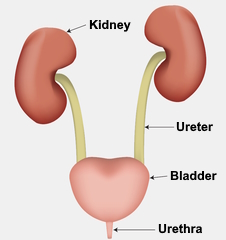Kidney infection (pyelonephritis) Pokenga whanewhane
Kidney infection is a painful bacterial infection of one or both of your kidneys. If it is treated early, there should be no serious harm. If it is left untreated, it can get worse and cause kidney damage.
Causes of kidney infection
Kidney infection usually happens because a germ (bacterium) on your skin enters your urethra — the tube you pass wee (urine) through. It then travels into your bladder and up into your kidneys.
Anyone can get a kidney infection, but it is more common in women. This is because a woman's urethra is shorter, which makes it easier for the bacteria to reach the bladder before moving to the kidneys.

The urinary system showing the kidneys and bladder
Other factors that can increase the risk of developing kidney infection include:
- a blocked urinary tract due to kidney stones or an enlarged prostate gland
- being born with an abnormal urinary tract
- being pregnant
- a weakened immune system, which can be due to diabetes
- urinary reflux, where small amounts of wee flow back from your bladder, up into your ureters and kidneys.
Symptoms of kidney infection
The symptoms of kidney infection in adults can include:
- a high temperature (fever)
- shivering or shaking
- pain and tenderness on both sides of your tummy or in your lower back (just below your ribs)
- needing to wee (pass urine) a lot
- pain or a burning sensation when weeing
- blood in your wee
- smelly wee
- feeling sick (nausea) and throwing up (vomiting)
- confusion, particularly in older people.
If you have symptoms of kidney infection, see your healthcare provider or after hours healthcare provider as soon as possible.
You can find information about the symptoms of kidney infection in tamariki (children) at KidsHealth.
Diagnosing a kidney infection
Your healthcare provider will ask about your symptoms and examine you.
You will need to have a urine test. You might also have a blood test to check for signs of infection and to measure your kidney function.
Treating a kidney infection
Kidney infections can become serious. They can almost always be cured, but it is best to get them treated quickly to prevent any complications.
Complications of kidney infections are rare, but they can cause permanent damage to your kidneys.
Your healthcare provider will usually prescribe:
- antibiotics to treat the infection
- simple pain relief medicines to reduce pain and lower your temperature.
Make sure you finish all of the antibiotics you are prescribed, even if you are feeling better. You should also drink plenty of fluids (water is best).
If the infection is severe or does not clear up quickly with antibiotics, you may need to go to hospital.
Preventing kidney infections
You can do some things to reduce your risk of getting a kidney infection:
- drink plenty of fluids (water is best)
- wee after having sex
- wipe from front to back after weeing or a poo (bowel motion).
There is some evidence that cranberry juice or cranberry supplements may help prevent urine infections in women and children, though not in pregnant or older people. There is no good advice on how much cranberry you need.
In Aotearoa New Zealand, we mostly have cranberry drinks rather than cranberry juice. Cranberry drinks may contain as little as 3% cranberry juice. If you have cranberry drinks, it is best to choose the 'light' or 'low sugar' varieties as the regular varieties have a high amount of sugar.